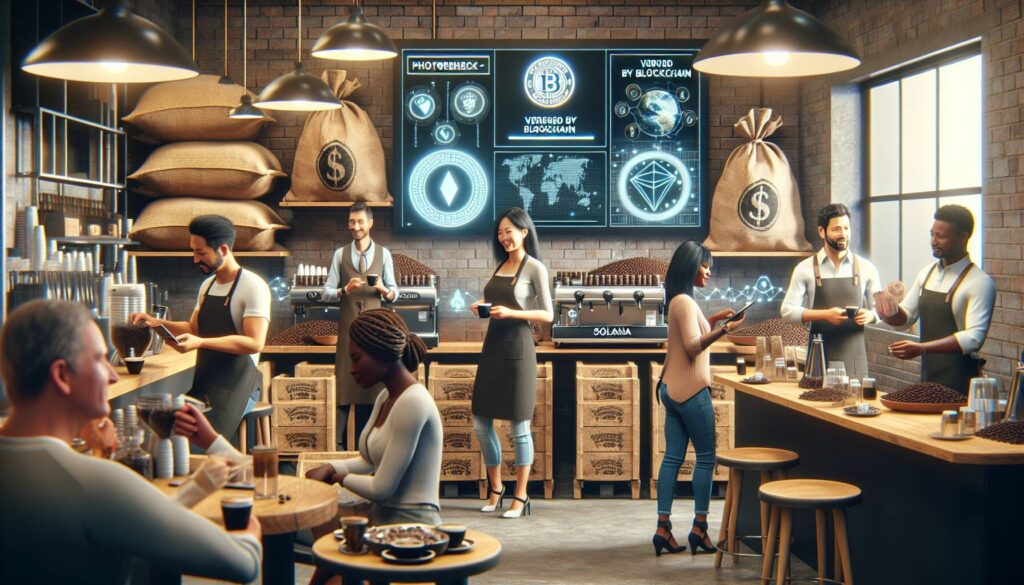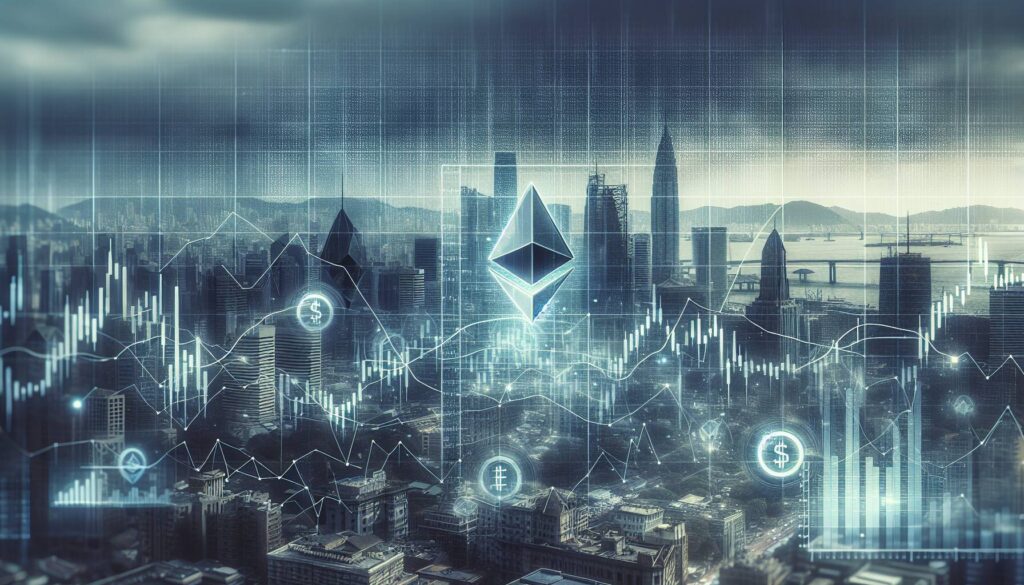The time-honored tradition of trading coffee, a commodity intricately tied to human history and culture, is stepping into the future. Coffee, a daily pick-me-up for billions and one of the world’s most traded commodities, has officially joined the blockchain revolution. Through an innovative move that bridges the physical and digital realms, Agridex has made coffee more than just a beverage—it’s now a tokenized asset on the Solana blockchain. This milestone signifies both a technological leap and a reimagining of how the global agricultural supply chain can be made more efficient, transparent, and accessible.
For centuries, the trading of coffee has been fraught with inefficiencies. Middlemen, fragmented supply chains, price speculation, and opaque market practices have long been hallmarks of the global coffee trade, often leaving producers underpaid and market participants uninformed. Enter blockchain technology, where each coffee bean can now carry a digital certificate that represents not just its origin and price, but also sustainability metrics, harvest conditions, and trade history. By putting coffee onchain, Agridex is enabling a radical shift to trustless, peer-to-peer transactions, ensuring every player in the value chain operates on the same reliable data.
Tokenizing coffee on Solana means converting batches of this physical commodity into digital tokens, or NFTs, that can be bought, sold, and settled instantly on the blockchain. These tokens provide not only proof of ownership but can also reflect complex contractual agreements. Imagine a coffee farmer in Colombia being able to directly sell tokenized batches of their beans to a café in Australia, bypassing layers of intermediaries while creating a digital handshake made immutable on the ledger. This reduces costs, increases transparency, and, crucially, allows producers to reclaim a larger slice of the commodity’s value.
A key enabler of this revolution is Solana’s high-speed, low-cost infrastructure, which ensures transactions can be executed in seconds for a fraction of a cent—a perfect fit for trade scenarios involving large volumes and numerous players. In many developing regions where coffee is grown, blockchain adoption has the potential to empower farmers by democratizing access to global markets and ensuring fairer pricing mechanisms. Furthermore, the immutable nature of blockchain provides consumers in end-markets with an unprecedented level of transparency. Buyers can trace the beans from farm to cup and verify that their purchases align with ethical sourcing and environmental standards.
This transformational use case for blockchain technology is also inspiring optimism around addressing the risks of market volatility. By tokenizing coffee, Agridex is making it possible to create financial derivatives like futures contracts based on these tokens. Traders can hedge price risks more effectively, while coffee-dependent businesses such as retailers and exporters can lock in pricing certainty. These mechanisms have the potential to alleviate some of the financial precarity faced by farmers whose livelihoods are too often dictated by extreme price swings in traditional markets.
As coffee takes its first steps into the world of decentralized ledgers, it’s a reminder that innovation isn’t just digital—it’s deeply human. The marriage of an ancient commodity and cutting-edge technology is paving the way for a more equitable and efficient global coffee trade, showing how blockchain can power meaningful, tangible change in the real world.
TLDR Summary:
- Coffee has been tokenized for the first time on the Solana blockchain through Agridex, marking a milestone for the global agricultural supply chain.
- Tokenization enables peer-to-peer transactions, digital proof of ownership, and supply chain transparency for coffee traders and producers.
- Blockchain infrastructure addresses inefficiencies in traditional markets, reducing intermediaries and ensuring fairer pricing for producers.
- Solana’s high-speed, low-cost network was chosen to facilitate these transactions, enabling scalability and affordability for all participants.
- This move opens the door to new financial instruments like tokenized coffee futures, which can mitigate market volatility and unlock new trading opportunities.
When selecting the ideal blockchain for their groundbreaking project, Agridex conducted thorough research before placing their bets on Solana. This high-performance blockchain network emerged as the perfect match for the first-ever tokenization of coffee due to its unprecedented combination of speed, scalability, and affordability. Each transaction on Solana can be executed in mere seconds at costs significantly lower than those of many other blockchain solutions, making it ideal for the fast-paced and cost-sensitive world of commodity trading.
Solana’s ability to handle over 65,000 transactions per second while maintaining decentralization made it a standout choice. With a global coffee market valued at over 0 billion in 2022 and millions of transactions conducted across the supply chain every year, the blockchain needed to withstand both current traffic and future scaling demands. This scalability ensures that as adoption of coffee tokenization grows, the network remains efficient and seamless—qualities critical to Agridex’s vision of revolutionizing the agricultural commodities market on a global scale.
Another major factor in this decision was Solana’s energy efficiency. In an age where environmental sustainability takes center stage, Agridex opted for a network that aligns with the ethos of their target market—coffee farmers, many of whom are already champions of environmental conservation. Unlike a consensus mechanism such as proof of work (used by Bitcoin), Solana utilizes proof of history combined with proof of stake, drastically reducing its carbon footprint. This low energy consumption was a decisive factor that allows Agridex’s operations to remain in line with the eco-conscious goals of both producers and consumers in the coffee industry.
The technical architecture of Solana also enables a layer of trustless smart contract functionality for settling trades. By leveraging smart contracts, Agridex is able to automate complex trade agreements—eliminating intermediaries while providing secure and immutable guarantees for all parties involved. For instance, a tokenized coffee contract executed between a grower and an international roaster can specify exact terms for delivery schedules, prices, and quality benchmarks. These terms are automatically verified and enforced by the blockchain’s code, removing distrust and reducing disputes that often plague traditional trade contracts.
Moreover, Solana’s ecosystem is mature and optimized for integrations. With its robust developer tools, comprehensive SDKs, and an active community of developers building solutions, Agridex benefits from a vibrant support network. This strong foundation accelerates time-to-market for additional features, such as real-time supply chain tracking and algorithmic pricing tools tied directly to the tokenized coffee assets. As Agridex scales its vision, this network ensures that essential innovations can be rolled out rapidly to address market needs.
Perhaps most compelling is how Solana makes global participation possible. Through its extremely low transaction fees, Agridex ensures cost savings trickle down to stakeholders like coffee farmers in underserved regions who already face razor-thin margins. These farmers can now access international marketplaces without bearing the prohibitive costs associated with traditional export logistics or high-fee blockchain networks. For example, a coffee producer in Ethiopia can tokenize their product and sell it directly to buyers in Europe or Asia without worrying that blockchain fees will chip away at their earnings.
By choosing Solana as the backbone of its innovative platform, Agridex ensures that all stakeholders—from growers to end consumers—can securely participate in a more transparent and efficient trading system. The synergy between Solana’s technical capabilities and the coffee trade’s pressing need for reform sets a powerful precedent for other agricultural commodities to follow suit.
TLDR Summary:
- Agridex selected Solana for its high-performance blockchain, capable of handling 65,000 transactions per second, ideal for scaling global coffee tokenization.
- Solana’s low transaction costs empower farmers in developing regions by lowering barriers to global trade and increasing their earnings.
- Energy-efficient proof-of-stake technology aligns with the eco-conscious priorities of coffee producers and consumers.
- Smart contract automation on Solana simplifies and secures trade agreements, reducing reliance on intermediaries and increasing trust in transactions.
- Solana’s rich developer ecosystem accelerates feature rollouts, ensuring Agridex can continue to innovate in the commodity trading space.
The concept of real-world asset tokenization is rapidly gaining traction, signaling a paradigm shift in how physical commodities and assets are managed, traded, and valued. At its core, tokenization involves converting tangible assets like commodities, real estate, or even coffee into digital tokens on a blockchain. Each token represents a fractional ownership or a slice of the asset. This approach not only unlocks unprecedented accessibility for investors but also introduces transformative levels of efficiency and transparency to markets traditionally riddled with inefficiencies.
For decades, the trading of real-world assets has remained bound by complex, slow, and geographically fragmented systems. When it comes to commodities like coffee, the challenges are well-documented—multilayered supply chains, opaque pricing mechanisms, and intermediaries cutting into the potential earnings of producers. Tokenization steps in to resolve these bottlenecks by creating a model in which anyone can securely and transparently participate. By anchoring assets on the blockchain, stakeholders—from farmers and traders to consumers and financial institutions—gain access to a shared and immutable ledger of information, ensuring that every transaction is verifiable and fraud-proof.
One of the most compelling benefits of tokenizing real-world assets is the possibility of fractional ownership. Imagine a scenario where a single sack of premium specialty coffee, instead of being sold as a whole unit, can be divided into tokenized shares. This democratizes access to markets, making previously inaccessible investments attainable to individuals with smaller budgets. A student in London or a retiree in Tokyo can now own a share of a high-grade Ethiopian coffee harvest without purchasing the entire lot, enabling micro-investments that weren’t feasible before. Fractionalized tokens blur the lines between producers and consumers, creating a hybrid economic model where end-users can also act as stakeholders in the value chain.
Furthermore, the decentralized nature of blockchain platforms eliminates the over-reliance on gatekeepers that frequently drive up costs. In agricultural commodities, this decentralization is especially impactful. Farmers, who traditionally receive only a small fraction of the product’s final retail price, can now directly reach buyers worldwide. Tokenized coffee, for example, skips several levels of trading houses and brokers, reducing associated overhead and ensuring more equitable revenue distribution. Similarly, end-consumers benefit from price reductions driven by fewer intermediaries and greater market liquidity.
In addition to simplifying ownership, tokenization enables innovative financial possibilities through decentralized finance (DeFi). Tokenized assets like coffee introduce exciting opportunities for creating new financial derivatives—futures contracts, options, and swaps—that historically have been exclusive to large-scale institutional investors. For example, coffee token holders could hedge against price volatility by locking in prices using tokenized derivatives, offering stability to both producers and retailers. Such mechanisms provide a safety net for farmers whose incomes are typically threatened by unpredictable market swings or extreme weather events that impact harvest yields.
Beyond its direct economic impact, tokenization also holds immense potential for improving transparency and enhancing sustainability practices. Each token can carry a detailed metadata history, including the asset’s origin, journey through the supply chain, and certifications related to ethical sourcing or environmental compliance. For conscious consumers and importers looking to verify the sustainability credentials of their products, these blockchain-stored records are invaluable. It allows them to trace a coffee bean’s journey “from farm to cup” with unprecedented detail. These verifications could extend to metrics such as water usage, carbon footprint, and worker pay rates, allowing environmentally and socially responsible practices to guide market demand.
The momentum behind real-world asset tokenization is not limited to coffee; it is resonating across various sectors. From luxury goods to renewable energy certificates, tokenization is becoming the bridge between physical and digital economies. According to a report by Boston Consulting Group, the market for tokenized assets could exceed trillion by 2030, driven by reduced barriers to entry, enhanced liquidity, and a growing appetite for decentralized systems. For asset classes long characterized by inefficiencies, this is more than just an evolution—it’s a revolution.
That said, the path to widespread adoption of asset tokenization isn’t without challenges. Regulatory compliance, standardization of token frameworks, and integration with legacy financial infrastructures are significant hurdles needing resolution. Additionally, education and awareness across all stakeholders—producers, traders, investors, and buyers—are critical for building trust and confidence in the ecosystem. However, if these challenges are overcome, the integration of blockchain into assets like coffee could serve as a blueprint for the tokenization of other global commodities.
As initiatives like Agridex demonstrate, real-world tokenization isn’t just a distant possibility—it’s actively reshaping industries in real time. The Solana blockchain’s role in hosting Agridex’s tokenized coffee transactions provides a tangible example of how decentralized systems can step up to modernize legacy industries. With the ability to connect the disparate dots of global supply chains while championing transparency, tokenization holds the promise of making markets more inclusive and sustainable for future generations.
TLDR Summary:
- Real-world asset tokenization converts physical assets like coffee into blockchain-based digital tokens, enabling unprecedented market accessibility.
- Tokenization facilitates fractional ownership, allowing smaller investors to own shares in large commodities like specialty coffee.
- By eliminating intermediaries, tokenization reduces costs and ensures fairer revenue distribution for producers like coffee farmers.
- Tokenized assets enable financial innovations such as DeFi-backed futures and derivatives to hedge price volatility and stabilize incomes.
- Tokenization enhances supply chain transparency, offering detailed insights into asset origins and sustainability practices to create more ethical markets.
As tokenized coffee charts a bold new course, the future of commodities trading onchain appears poised for seismic shifts in how global markets operate. Blockchain technology, with its innate ability to decentralize, streamline, and digitize, holds profound implications for commodities far beyond coffee. Modern supply chains for raw materials—ranging from grains and livestock to oil and metals—have already been grappling with challenges related to inefficiency, fraud, and lack of transparency. The onchain model promises to rewrite this centuries-old playbook and pave the way for a highly efficient, equitable, and data-driven ecosystem.
One of the most transformative effects of onchain trading lies in its democratizing power. Traditionally, commodities trading has remained the domain of well-capitalized entities like large trading houses, multinational corporations, and financial institutions, often leaving smaller players with minimal bargaining power or access. Tokenization opens up these markets, enabling greater participation for smaller producers, traders, and even retail investors. Take, for example, a farmer in Argentina growing soybeans. With tokenization, their crops can be fractionalized into digital assets sold directly to processors and exporters. This bypasses expensive intermediaries while providing liquidity to the farmer much earlier in the supply chain.
Beyond market access, blockchain-enabled trading ensures a level of transparency that was once considered unattainable. For commodities that pass through extensive networks—moving from seas and ports to warehouses and final destinations—tracking and verifying authenticity has always been a critical pain point. Blockchain’s immutable ledger allows stakeholders to monitor a commodity’s origins, journey, and conditions in real time. For buyers, this means confidence in the quality and conditions of their purchase, whether it’s sustainably grown coffee or ethically mined gold. For regulators, it streamlines auditing and compliance processes, vastly reducing the resources required to catch fraud or enforce standards.
The value of onchain trading also extends to resolving one of the commodities market’s most persistent vulnerabilities: price volatility. Farmers, shippers, buyers, and even distributors have spent decades contending with abrupt price swings triggered by variables like weather events, political instability, and speculative trading. By bringing commodities like coffee onto the blockchain and tying them to smart contract-enabled derivatives, participants can lock in pricing agreements months or years in advance. These automated contracts reduce uncertainty, stabilize incomes for producers, and create predictable cash flows for importers and retailers—a win-win scenario for industries shaped by risk.
Looking even further down the line, blockchain technology could enable the next generation of decentralized commodity exchanges. Unlike traditional exchanges such as the Chicago Mercantile Exchange or the London Metal Exchange, these blockchain-powered platforms would run without centralized authorities, relying instead on smart contracts to execute trades at lightning speed and near-zero cost. Such systems could allow for 24/7 trading of tokenized commodities, attracting a new wave of global retail participants and reshaping commodity futures as liquid, globally accessible markets. Additionally, marketplaces could integrate Machine-to-Machine (M2M) transactions, where IoT-connected devices—such as smart silos or automated warehouses—buy and sell commodities autonomously based on predefined conditions.
However, perhaps the most exciting potential in the future lies in pairing asset tokenization with sustainability initiatives. Climate change remains one of the foremost challenges to agriculture and commodity production. Blockchain technology could unearth innovative ways to tackle this issue directly. For instance, tokenized crops could embed carbon credits, rewarding farmers who practice regenerative agriculture while enabling buyers to offset their footprint as part of the same transaction. Additionally, automated compliance mechanisms coded directly into smart contracts can enforce sustainability benchmarks and certifications such as “fair trade” or “organic,” effectively eliminating fraudulent claims and greenwashing from the market.
A deep synergy also lies in the ability of tokenization to unlock data for decision-making. Imagine aggregating real-time data from supply chains for tokenized commodities, giving governments the granular insights needed to manage food security risks or regulate strategic reserves. Similarly, smallholder farmers could gain access to predictive analytics driven by this new wealth of data, enabling them to plan harvest cycles more efficiently or identify optimal selling windows to maximize profitability. This data-driven approach represents the confluence of blockchain and AI, pushing the boundaries of what real-world asset management can achieve.
Of course, this vision of the future doesn’t come without its challenges. While the technical infrastructure of blockchains like Solana is ready and capable, scaling these systems globally requires solving complex issues around interoperability, multi-jurisdictional regulation, and education. Moreover, commodity-producing nations would need to reconcile tokenized trading with their existing financial frameworks to ensure it enhances, rather than disrupts, their local economies.
Despite these hurdles, one truth is becoming increasingly clear: the intersection of blockchain and commodities is no longer aspirational—it is inevitable. Each successful experiment, like Agridex’s tokenized coffee on Solana, inches us closer to this decentralized reality. While the coffee trade serves as a starting point, its progress hints at what’s on the horizon—a marketplace in which all commodities, from the food we eat to the materials used to build our cities, are seamlessly connected, traded, and governed onchain.
TLDR Summary:
- The future of onchain commodities trading democratizes markets, allowing small producers and retail investors to participate directly.
- Blockchain technology ensures transparency across global supply chains, reducing fraud and boosting confidence in product authenticity.
- Smart contract-enabled derivatives bring price stability for traditionally volatile commodity markets.
- Future decentralized exchanges could introduce 24/7, cost-efficient trading while integrating IoT-driven autonomous transactions.
- Tokenization paves the way for sustainability-linked trading, embedding carbon credits and enforcing ecological compliance directly into tokenized commodities.















